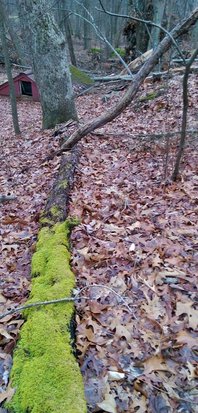 Matthew 4:1-11 This story from Matthew guides us into Lent, because Jesus fasts forty days in the wilderness, and Lent is the fasting season before Easter. But those 40 days get only a sentence in the book of Matthew. It makes sense, from a literary perspective, to focus on Jesus’ dialog with the Devil, to hone in on the conflict, rather than give readers a glimpse of Jesus’ 40 days. But since we turn to this story to enter into our own 40 days of Lent, I want to know more about Jesus’ 40 hungry days! I imagine him dirty, dark circles under his eyes, face gaunt, shoulders slumped, weary—and also serene….I probably romanticize his wild time as holier than it would have felt to be hungry for 40 days. Are you giving something up this Lent? Phillip and I decided to give up sugar this year. We talked about it a couple weeks ago, and wondered if we would give up all sweeteners, or just processed sugar. We never got around to deciding, we’ve been thinking about other things and then on Thursday night as we split a fabulous dark chocolate bar we realized that we were definitely breaking our Lenten fast, on day two! We promised we’d figure out the details…and figured we might as well finish the chocolate. Fasting has a rich history in Christianity, but most Protestants don’t practice it these days. It’s hard enough to fast in a world as overflowing with food as ours, but without a community of support and accountability, fasting takes extreme discipline. We can read about Jewish families preparing for Passover’s weeklong diet by getting all the yeast and leaven out of the house. Then for a week they eat unleavened bread, like matzah. Mardi Gras, French for Fat Tuesday is similar. The day before Lent begins, many Christians have a big feast to use up all the fatty, rich foods in the house before the lean fast of Lent. If Phillip and I properly celebrated Mardi Gras this year we would have thrown a big party and eaten all the sugar in the house so that we could start Lent without any temptations around. That would’ve helped. But within days we’d swing by Weis for groceries and be surrounded by sugar – not just in desserts, but in nearly every processed food in the store – soup, bread, most things in boxes or cans or bags have some sneaky form of sweetener. Let alone all the social and church occasions with sweet food provided – how often do you pick up some cookies for a church event? They’re so easy – no fridge or fork necessary. For all these reasons, I believe fasting – for Lent or any other occasion – is harder in our time and society. Fasting certainly isn’t easy in other times or places – people get hungry! People want treats! But if we lived in a religiously uniform community where we all feasted and fasted on the same schedule, Weis and Giant would stock their shelves accordingly, we’d follow the same rules for the potlucks, and we could commiserate together about what we’re hungry for. But we live with religious diversity, and we live in a culture of constant feasting. Religious traditions pair fasts with feasts – Lent is the fasting season to prepare for the feast of Easter. But in our culture we feast all the time – Sunday dinner is a traditional feast for some families, most of us have dessert every evening of the week and sometimes at lunch, too, and some people eat donuts for breakfast. Then there are office parties and church parties and birthday parties and Super Bowl parties and holidays. Then the reception at the speech or musical or gallery opening has cookies and punch. The only shared cultural concept we have today for fasting is dieting, which is fundamentally different. Dieting is individualistic, it’s about making oneself acceptable.  Our culture finds people worthy if they meet specific beauty standards. We consider physical health and fitness to be not just aesthetically good, but morally good. Dieting is one of the main ways individuals in our society try to become worthy – to themselves, to the people around them, and even to God. Have you encountered churches built on dieting? I know someone whose congregation’s primary focus is losing weight, she actually got skinny to please Jesus. There are tons of diets that claim to be based on Biblical truths. Since our culture considers slim, toned bodies to be not just physically superior, but aesthetically and morally superior to other bodies, dieting becomes an essential element in salvation. That’s sad and it’s dangerous, especially for young people who are already dealing with enough worry about their bodies. And it’s terrible for people who live with disabilities, or all of us who will get older and older. Dieting as salvation also undermines community. Dieting is built on individual benchmarks of pounds or inches lost. Fasting might result in lost weight, but it’s inherently a communal practice for the sake of a community’s relationship with God. But we’re out of practice. The Christian fast of Lent feels about as relevant as the Jewish fast of Passover. I mean, honestly – what does fasting mean to us? Symbolically—and even just the definition – what is fasting? During Ramadan Muslims fast from all food and even water from sunup to sundown. The Lent fast usually means no rich foods, hence Fat Tuesday, Mardi Gras, Shrove Tuesday, Pancake Tuesday – all for people who are giving up fats and sometimes eggs for Lent. And much of the world celebrates Carnival before Lent – Carnival comes from the Latin carnelevamen which means putting away flesh. Much of the world’s Lent fast is from meat, so Carnival is when you finish eating all the meat in the town. As a kid I remember fish was always on the school lunch menu on Fridays, and my mom told me that was because Catholics fast on Fridays to remember Jesus dying on a Friday. It didn’t make any sense to me because I thought fasting was not eating at all, but for many Christians, fasting is not eating meat from warm-blooded animals. Truly, how can fasting be relevant to us this Lent? When fasting means so many different things to different people? When our local community is religiously diverse? When this congregation intentionally welcomes people regardless of their faith journey or relationship with God? We would be the last church to declare a shared Lenten fast because we don’t dictate things like that. But fasting is only relevant – and perhaps only possible – in community. I don’t have any answers to these questions. I just want to talk about all this together, because if we think we’re supposed to know what Lent is about, if we think we’re supposed to be on the same page about fasting, the church just becomes less relevant. To most people in my generation the church is officially irrelevant, for many reasons. One easy way for churches to become irrelevant is parading traditions around that aren’t explained, that aren’t truly claimed by the living community. This Lent I’m still going to try to fast from sugar. And I’m also going to try to avoid assuming that we’re on the same page about traditions or ideas that we’re not holding up and considering, together. So here’s some more Lent 101. The English word Lent comes from the German word for spring, Lenz, which is derived from the German word for long because the days get longer through the spring. In most of the world, this time of Lent is simply called “fortieth, like in Spanish, cuaresma.” Lent’s 40 days particularly invoke Jesus’ time in the wilderness, that Tara read about this morning. But we know there are all sorts of forties in the Bible: Noah waits out 40 days of rain on the ark, Moses spends 40 days on Mount Sinai, the Israelites wander in the wilderness for 40 years after escaping slavery in Egypt, Elijah walks for forty days and nights to Mount Horeb, Jonah tells the Ninevites they have 40 days to repent. Tradition says that Jesus spent 40 hours in the tomb, from Friday night to Sunday morning. But wait – isn’t Easter more than 40 days away? Lent looks like 47 days, but the Sundays don’t count (according to tradition every Sunday of the year, even during the solemn wilderness of Lent, is a mini-Easter). Lent’s 40 days are a time for stepping back from the rush of everyday life to a mindful self-searching. Even if it’s not fat or sugar or meat, often people give something up, shed some habits. Wouldn’t it be easier to fast – from fat or sugar or meat or Facebook or gossiping – if we were in the wilderness? If we were on silent retreat in a monastery without internet or processed foods, we’d have such a good Lent, right?! We’d grow spiritually, emerge serene and close to God and grounded in ourselves. We might. But we don’t live in that sort of wilderness. We are in this world, all the way in. Remember how the story of Jesus in the wilderness rushes right past his crucial 40 days of fasting to a dramatic conversation with the devil. We might be tempted to read right past the 40 days of fasting, as well. Let’s get to the conflict! The drama! When I was first reflecting on the scripture for today I thought this was unfortunate – maybe even a mistake. I felt we should dwell in the fasting time, dwell in the wilderness with Jesus. But as the week went by I read it differently. It’s like Jesus is sympathizing with us who live in this world, all the way in, with smart phones connecting us and fat/sugar/meat on every block. Jesus doesn’t get a long story about his barren, pure 40 days of wilderness. The story rushes to his temptations: tasty food, political power and the arms of angels. How can we get to the wilderness in our world? We can go camping, sure, we can even go without food and meditate on Jesus’ 40 days. Most of us do find holiness, peace and clarity, in the grand outdoors of parks and forests and streams. Rachel Carson says it this way: “Is the exploration of the natural world just a pleasant way to pass the golden hours of childhood or is there something deeper? I am sure there is something much deeper, something lasting and significant. Those who dwell, as scientists or laymen, among the beauties and mysteries of the earth are never alone or weary of life. Whatever the vexations or concerns of their personal lives, their thoughts can find paths that lead to inner contentment and to renewed excitement in living.…There is symbolic as well as actual beauty in the migration of the birds, the ebb and flow of the tides, the folded bud ready for the spring. There is something infinitely healing in the repeated refrains of nature – the assurance that dawn comes after night, and spring after the winter.” - Rachel Carson, The Sense of Wonder But those of us in this room have not made our home in that kind of wilderness, we may go fishing or birding or hiking but we all make it back home to email and running water and busy-ness before too long. Real life, we might call it. This world. So what can we hope for? Where can we find wild, holy ground? I find hope in a quote from Dietrich Bonhoeffer: “It is only by living completely in this world that one learns to have faith. By this-worldliness I mean living unreservedly in life's duties, problems, successes and failures. In so doing we throw ourselves completely into the arms of God, taking seriously, not our own sufferings, but those of God in the world. That, I think, is faith.” We can get to holy ground through other-worldliness, venturing out into the wilderness. We can get to holy ground through this-worldliness, leaning all the way into our lives here. This Lent we dig into holy ground together. The bare, dirty ground of wilderness. The holy ground of soil – look at this soil in our worship center. You can come up later to really see it. What might look like empty, barren dirt is already teeming with life, tiny life that feeds bulbs and seeds so that, as time as sun and rain pass, we can see life bursting forth. When has your life been that kind of holy ground? When have you thought you were empty, bare, and with time found yourself teeming with life? John Soos writes, “To be of the Earth is to know the restlessness of being a seed the darkness of being planted the struggle toward the light the pain of growth into the light the joy of bursting and bearing fruit the love of being food for someone the scattering of your seeds the decay of the seasons the mystery of death and the miracle of birth.” — John Soos, Earth Prayers People often say we fast during Lent in penance – to make up for our sinful ways. Or they say we fast during Lent in solidarity with Jesus’ suffering on the cross. If that inspires you – go for it. But I don’t resonate with those reasons. Plus it just feels like a big trick, because most of us want donuts even more when we’re guilty or sad. We might fast to be in solidarity with hungry people around the world. I read this week that in northeast Nigeria, where Boko Haram has control and famine is increasing thanks to climate change, drought and political instability, there are virtually no children under the age of 5. The vulnerable – the young and old and ill – die first in famine. No children left under the age of 5 in northeast Nigeria. I read that and was just paralyzed. Giving up sugar for Lent just sounds silly in the face of that hunger. But each time I want something sweet, and remember I have a choice, if I take each moment of want as an opportunity to pray for people in Nigeria, there could be purpose in my fast. Fasting from something – whether it’s candy or candy crush, offers us emptiness. Emptiness, which we are naturally inclined to fill. Emptiness, like wilderness, holy, bare ground. Lent is our invitation to dwell in the emptiness that follows us through all the ups and downs of our lives. The emptiness of broken hearts, broken bodies, broken relationships, broken dreams, broken promises. Our natural reaction to the emptiness of emotional pain is to distract ourselves, and we have sugar, alcohol, television, gambling and a zillion other places to run to. Lent’s fasting is a journey of recovery as we move toward resurrection. Like a teenager entering the wilderness alone as a rite of passage into adulthood, we strike out into Lent’s desert for the risk and for the reward. We come to church to feel close to God – God is everywhere, but it can be easier to feel God’s presence here. And for many people, God is easier to feel in the tangible stories of Jesus. In Lent we particularly tune in to Jesus’ physical, fleshy, incarnate being. All of us with bodies can share the experience of hunger. How hungry would you be after 40 days of fasting? On which day would your stomach stop growling and simply shut down? I did a cleansing fast for a week – not zero intake, but pretty close to zero. It was so hard, I was hungry throughout the week. I’ve heard that after enough days of fasting, people lose their desire for food, their stomachs stop growling. Mine didn’t. In fact, that week I thought about food pretty much all the time. Which is unfortunate if we’re fasting to achieve some spiritual transcendence from our bodies! But splitting our spirits from our bodies really doesn’t work, because we are both spirit and flesh, and we are divinely designed this way. But my week of fasting did give me innumerable occasions to consider my hunger. How often I think I’m hungry, but I’m really bored. Or tired. Or anxious. How often when I crave chocolate, I’m tired and looking for a boost. How often when I crave mashed potatoes, what I really want is calm and comfort. What are you hungry for today? What fuels your hunger? What soothes your hunger? We are called to Lent’s holy ground, to the wilderness, to see ourselves bare, to surrender our pretenses and face into our emptiness. This is not a journey for the faint of heart, but for all of us who fear and can claim our fear. For us who long, and can claim our longing. We will never walk this journey alone. Amen.
1 Comment
5/29/2019 07:34:47 pm
Lent season is the perfect time for you to realize all things you've done in your life. It is also a moment wherein you to reflect and acknowledge the mistake that you've done. At the same time, you need to think of the solution for the problems you have made. Lent season will make us feel that it's about time to change and improve our faith even more! if we are going to do that, I am sure that more changes are about come! We certainly just have to wait for that!
Reply
Leave a Reply. |
Archives
January 2022
|

 RSS Feed
RSS Feed